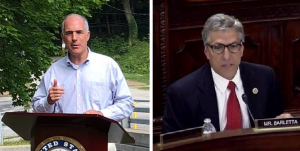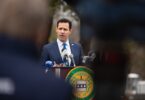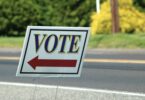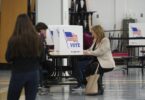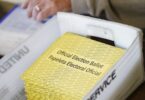As Pennsylvania’s candidates for the U.S. Senate seat that will be on the ballot in November make appearances and speeches all across the state, they naturally seek to highlight their differences and make clear the divisions between them.
But as U.S. Sen. Bob Casey, the incumbent, and Congressman Lou Barletta, his challenger, made separate appearances at the recent County Commissioners Association of Pennsylvania conference, they both leaned strongly on two points – local officials need more help from Washington to meet constituents’ needs, and the U.S. Congress is only effective when it operates in a bipartisan fashion.
They didn’t agree on everything, though. Casey, a Democrat, peppered his speech with a fair amount of criticism of President Donald Trump. Barletta, a Republican and noted Trump ally, spent some time talking about the negative effects of illegal immigration that he saw when he was the mayor of Hazleton.
Casey praised his colleagues in Congress for rejecting a Trump administration proposal to do away with the Community Development Block Grant program in the last federal budget negotiation.
“The good news is, House members, and especially Senators, in both parties came together and said, ‘No, we’re not eliminating the Community Development Block Grant Program,’” Casey said. “[It’s] the program that you need for economic development, or job creation or blight removal, or water and sewer or so many other priorities that you face as commissioners. The good news is the $3 billion program became a $3.3 billion program. So we added $300 million.”
The senator noted that he had suggested that very number, $3.3 billion, in a letter voicing support for the program.
“So in one moment, I looked both prophetic and very effective,” he said. “But of course, it wasn’t just my letter, it was a consensus position in both parties.”
Barletta made a point of connecting his experiences as a mayor to the realities that the county commissioners face. He described his efforts to revitalize what was a struggling downtown business district when he came into office. By going door-to-door in a nearby neighborhood with a Latino population, he determined that there was a need for a soccer field.
“We didn’t have a soccer field in Hazleton,” he said. “So we built an artificially surfaced soccer arena that could be flooded in a winter time for ice skating and a new playground. And we used CDBG money, community development block grant money. … Still, people had no idea that I was going to build a neighborhood around it. They thought I was crazy.”
On the topic of federal infrastructure spending, Casey suggested that Trump had made a political miscalculation that was preventing progress. He pointed out that Pennsylvania has extensive infrastructure needs, especially in the areas of structurally deficient bridges and rural areas that lack broadband internet.
“The president said in, I guess it was back in October, when we were meeting about tax reform, he said in a meeting talking about tax reform that he wished he had started with infrastructure, instead of going right to health care repeal,” Casey said. “I wish he did as well, because this is not going to work unless you have a bipartisan proposal led by the president.”
Barletta touched on the subject that led him to move from the mayor’s office to the U.S. House of Representatives – a dramatic rise in the number of illegal immigrants that he saw in Hazleton in the aftermath of revitalization efforts.
“Because as the city was coming back again, our population grew,” he said. “It grew by 50 percent, which is a huge growth for a city. But our tax revenue stayed the same. So we had wiped out a $1.2 million deficit, we now had a half a million dollar surplus, and I began to feel that financial drain again, and it wasn’t until we realized we have another problem to deal with. Imagine trying to provide services to 50 percent more people without any revenue to do that.”
After traveling to Washington seeking federal assistance to deal with the issue and being frustrated by the response, he said, he felt he had no choice but to run for Congress.
“When I went to Congress, I wanted to make sure that I stayed connected, because of what I experienced because of how the federal government let me down as a mayor and a local official,” he said. “I wanted to make sure that I was a voice for our local government, and our local officials.”
Casey told a story from the last years before the death of his father, former Gov. Bob Casey Sr. When a conversation turned to discussion of a potential candidate who had declined to run for a county commissioner position, Casey said, his father jumped in to defend that decision.
“He said, ‘Do they have any idea how hard it is to be a county commissioner, and what you have to deal with every day?’” Casey continued. “And I had some sense of it, … but just hearing my father walk through all the challenges that you face every day … he could really empathize with or understand the challenges that county commissioners face every day. And I tell that story because I think we often, those of us who are in federal government, or state government, even, sometimes don’t realize or have a full appreciation for the challenges that you have to meet every day.”



